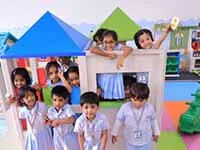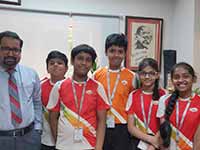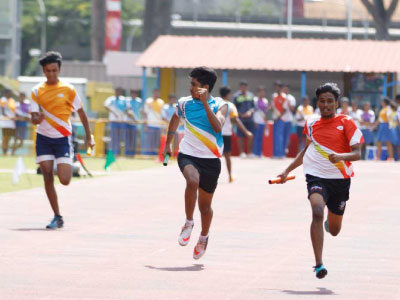Introduction: The Importance of Teaching Decision-Making Skills to Students
Making decisions is a crucial component of a student’s academic and psychological growth. Students must make a variety of decisions that will affect their future. They are better equipped to handle life’s obstacles if they are taught how to make educated, logical, and deliberate judgements early on. Additionally, it fosters their sense of self-assurance, self-reliance, and accountability.
Our goal at GIIS Noida is to develop these abilities by using creative teaching methods. By integrating problem-solving techniques into the curriculum, we empower students to analyse situations critically and make educated decisions.
Guide Students in Finding Solutions
One of the primary ways to enhance decision-making skills in students is by guiding them in finding solutions to problems independently. Teachers can encourage students to think critically, assess various viewpoints, and decide on the best course of action rather of providing them with answers.
Strategies to Guide Students in Problem-Solving
- Promoting brainstorming sessions: Students should be taught to weigh multiple ideas before choosing the best one.
- Teaching organised problem-solving models: IDEAL models (Identify, Define, Explore, Act, Look) are one example of a framework that can help students better organise their thoughts.
- Encouraging peer discussions: By cooperating with their peers, students can assess many viewpoints and make better conclusions.
- Promoting questioning strategies: Teachers should pose open-ended enquiries to compel students to reflect more thoroughly.
- Offering real-life scenarios: Students can practise making decisions by presenting them with real-world problems.
- Encouraging trial and error: Kids who are allowed to try out solutions and learn from mistakes foster resilience and confidence.
- Integrating technology tools: AI-powered decision-making tools and online simulations allow pupils to practise problem-solving in a virtual setting.
Encourage Thoughtful Analysis
Making wise selections requires careful consideration of all available options. Teachers can assist students in logically assessing circumstances and weighing potential outcomes before acting by providing them with analytical tools.
How to Encourage Analytical Thinking
- Teach cost-benefit analysis: Students can make wise decisions when they are assisted in weighing the advantages and disadvantages of a scenario.
- Use mind mapping techniques: Clarity is improved when students are encouraged to illustrate their options visually.
- Apply case studies: Understanding decision-making patterns is facilitated by examining previous real-world situations.
- Encourage self-reflection: Students are better able to identify areas for growth when they are asked to consider their previous choices.
- Foster a questioning mindset: Before making judgements, students should be taught to question “What if?” and “Why?”
- Engage in Socratic questioning:Students’ critical thinking is strengthened through facilitated conversations in which they examine many points of view.
- Provide data-driven decision-making exercises: Encouraging students to base their choices on statistics and research fosters logical reasoning.
To guarantee that students at GIIS Noida acquire keen analytical thinking and problem-solving abilities, we incorporate these approaches.
Engage in Interactive Role Activities
Students can practise weighing alternatives in a dynamic, controlled setting by participating in role-playing exercises that immerse them in decision-making scenarios.
Benefits of Role-Playing in Decision-Making
- Enhances empathy: Understanding different perspectives leads to more informed decisions.
- Simulates real-world experiences: Hands-on learning improves retention and skill development.
- Builds confidence: Practicing decision-making in a safe environment boosts self-assurance.
- Develops communication skills: Articulating thoughts during role-play strengthens expression and reasoning.
- Encourages teamwork: Group role-play fosters collaboration and negotiation skills.
- Improves adaptability: Facing different scenarios prepares students for real-life unpredictability.
- Strengthens ethical reasoning: Exploring moral dilemmas helps students develop a strong sense of responsibility.
At GIIS Noida, we use interactive classroom techniques, ensuring students get hands-on practice with real-world decision-making processes.
Include Practical, Real-World Situations
Wondering how to develop problem solving skills? Well, practical learning experiences are essential for effectively developing problem-solving skills. While theoretical knowledge provides the foundation, applying it to real-world situations allows students to see the relevance and impact of their choices. By tackling hands-on challenges, students are able to bridge the gap between abstract concepts and practical application.
Ways to Incorporate Real-World Learning
- Internships and field visits: Exposure to industries gives students firsthand insights into career-based decision-making.
- Community engagement projects: Volunteering experiences teach responsibility and social awareness.
- Financial literacy exercises: Budgeting activities help students understand money management and financial decision-making.
- Business simulations: Entrepreneurship projects provide a practical understanding of risk and reward.
- Scenario-based discussions: Reviewing real-life case studies enhances critical thinking.
- Encouraging social responsibility projects: Decision-making in social contexts fosters ethical awareness and leadership skills.
- Integrating AI and technology challenges: Using real-world simulations helps students make data-driven decisions.
GIIS Noida makes sure students understand the value of making well-rounded decisions by providing them with real-world learning experiences. Through Co-Curricular Activities, students receive additional opportunities to enhance their decision-making abilities.
Build a Nurturing Atmosphere
A positive and encouraging environment plays a pivotal role in helping students make thoughtful, well-considered decisions. When students feel supported and valued, they are more likely to take risks, explore new ideas, and approach decision-making with confidence. In such an environment, students can engage in open discussions, seek guidance without fear of judgment, and feel empowered to make choices that align with their values and goals.
How to Foster a Supportive Learning Atmosphere
- Promote a growth mindset: Encouraging students to learn from mistakes builds resilience.
- Provide constructive feedback: Teachers should guide students with actionable suggestions.
- Celebrate small wins: Recognising progress motivates students to improve their problem-solving skills.
- Encourage open discussions: Safe spaces allow students to express thoughts without fear of criticism.
- Instill self-trust: Teaching students to believe in their abilities enhances confidence.
- Create mentorship programs: Pairing students with experienced mentors strengthens guidance and decision-making capabilities.
We foster an atmosphere at GIIS Noida where students are comfortable exploring their capacity for making decisions.
Help Students Review Their Actions
As one of the best CBSE schools in Noida, GIIS Noida provides a structured, engaging, and supportive environment for students to develop their decision-making and problem-solving skills. Self-evaluation is a crucial component of honing decision-making skills. It pushes students to consider their previous decisions, evaluate the results, and pinpoint areas in which they may do better. Students can better understand the mental processes that resulted in both positive and poor outcomes by going back and reviewing their choices.
Techniques to Support Self-Review
- Maintaining decision journals: Documenting decisions and their outcomes enhances reflection.
- Conducting group feedback sessions: Discussing choices with peers fosters learning.
- Applying structured self-assessments: Checklists and surveys help track progress.
- Encouraging mentorship guidance: Mentors provide insights for improvement.
- Reviewing cause-and-effect scenarios: Analysing results reinforces learning from mistakes.
- Introducing self-improvement plans: Helping students set personal development goals enhances future decision-making.
Develop the Ability to Manage Emotions
Emotions have a significant impact on our decisions, affecting our ideas, actions, and perceptions in ways we might not always be aware of. Students’ capacity to control and manage these emotions can significantly enhance their ability to make decisions. Students who get emotional regulation instruction acquire the skills necessary to stop, think, and evaluate their emotions before making decisions.
Emotional Management Strategies
- Practice mindfulness techniques: Meditation and deep breathing exercises reduce stress.
- Teach impulse control methods: Encouraging patience minimises rash decisions.
- Use role-playing for emotional scenarios: Experiencing different perspectives enhances emotional intelligence.
- Encourage journaling for emotional clarity: Writing down thoughts fosters awareness.
- Integrate Social Emotional Learning (SEL): SEL programs support emotional growth and decision-making.
- Provide conflict resolution training: Teaching negotiation and compromise fosters balanced decision-making.
Conclusion
Decision-making skills are an essential component of student development. By integrating analytical thinking, real-world applications, emotional management, and interactive learning, GIIS Noida ensures students cultivate strong problem-solving skills.























